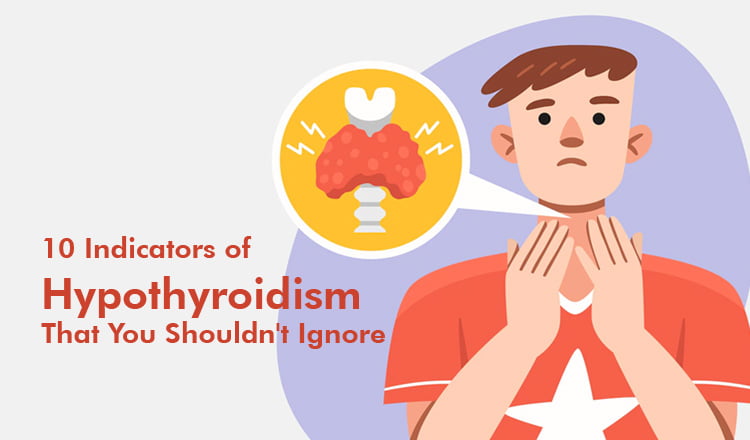
What is Hypothyroidism?
Hypothyroidism known as an underactive thyroid is a disorder for which the thyroid gland produces insufficient amounts of some important hormones. In the initial stages of hypothyroidism, there may be no visible symptoms.
To detect hypothyroidism, accurate thyroid dysfunction tests are available. Once you and the doctor have determined the best dosage for you, therapy with artificial thyroid hormone is generally easy, safe, and effective.
However, homeopathy has received significant results in treating Hypothyroidism. It can be completely healed if someone who is suffering can follow the therapy with time with the help of homeopathic consultancy.
Must Read: Getting Cold Frequently?
What are the symptoms of Hypothyroidism?
The basic symptoms of hypothyroidism fluctuate depending on the extent of hormone deficiency. Problems frequently develop gradually over time.
Initially, signs of hypothyroidism, including fatigue and weight gain, may go unnoticed. You may also blame them for becoming older. However, when your metabolism slows, you may experience more visible problems.
Among the indications and symptoms of hypothyroidism are:
- Fatigue
- Cold sensitivity has increased.
- Constipation
- Weight increase due to dry skin
- Face puffiness
- Hoarseness
- Muscle fatigue
- High blood cholesterol levels
- Aches, soreness, and rigidity in the muscles
- Joint pain, stiffness, or edoema
- Menstrual cycles irregularities or that are heavier than usual
- Hair thinning
- Heart rate has slowed
- Depression
- Memory impairment
- Thyroid gland enlargement (goiter)
These symptoms can be shown at the very early aged as well as in increased stages. Therefore, for treating Hypothyroidism this signs should not be ignored.
Must Read:
10 Hypothyroidism Warning Signs You Shouldn’t Ignore
Women are more susceptible to thyroid disorders than men, particularly following pregnancy and menopause. According to statistics, one out of every eight women globally suffers from thyroid disease; however, 60% of women are unaware of its symptoms. It is generally the case because thyroid warning indicators might be mistaken for other health issues.
Here are 10 warning signs to should not be ignored for
Weakness and fatigue
At a period where fatigue or decreased energy is so common, it’s easy to dismiss them as symptoms of something more serious. Frequent fatigue or chronic lethargy can be symptoms of a thyroid problem. Because the thyroid hormone controls metabolism, a hyperactive thyroid increases metabolism, leading to energy loss and fatigue. On the opposite, an underactive thyroid can impair metabolic function, making you feel sluggish and weary.
Must Read: Thyroid Hormones and Metabolism Connection
Excessive weight gain or loss
Because the thyroid gland is so important in metabolism, any unusual weight fluctuation could be thyroid. Low thyroid hormone levels in the body can induce weight gain, whereas an overactive thyroid can secrete excessive hormones, resulting in sudden weight reduction.
Heat or cold sensitivity
The metabolism speeds up and the body consumes more energy than normal as a result of an overactive thyroid. This not only affects weight but also promotes heat sensitivity. Heat intolerance, excessive sweating, and even stress are all symptoms of hyperthyroidism.
Must Read: Autism between different age group, how can homeopathy help?
Pigmentation in the neck area
The browning of folds of skin around the neck is a very common early indication of thyroid disease. This coloration is produced by a hormonal frenzy and it is very common whenever the thyroid gland malfunctions. Because the thyroid is also in charge of beauty needs and health, any change in hormone levels may result in itching scalp, dry or oily skin, thinning hair, or brittle nails. If you experience some or all of these symptoms, you should consult your doctor.
Sleeping difficulties
Sleeping difficulties can be caused by an underlying thyroid condition. If you’ve been turning and tossing in bed, it may be a sign of thyroid malfunction. An hyperactive thyroid can affect your mood, neurological system, and make you weary, making it difficult to sleep comfortably.
Anxiety and mental fog
Anxiety, burnout, stress, and brain fog have all been highlighted as mental health disorders. Such signs should not be overlooked or dismissed because they may suggest a serious problem. Thyroid disease makes women more prone to anxiety, agitation, tremors, mood changes, and cognitive fog.
Must Read: Homeopathy Treatment for Typhoid Fever
Irregular menstruation
While monthly abnormalities are frequently addressed as indicators of PCOS and infertility, they may also be a symptom of thyroid disease. Thyroid disruption can induce alterations in the monthly cycle and disrupt the normal menstrual flow. Because the thyroid gland regulates the reproductive organs, low or high thyroid hormone levels can cause periods to be lighter, heavier, or scantier.
Have diarrhea or constipation
Constipation is prevalent in hypothyroidism and also can indicate that you will require more thyroid hormone and that you’re using enough antithyroid medication. Diarrhea or loose stools are also related with hyperthyroidism and can indicate that your thyroid hormone dosage is too high or and you need to raise your antithyroid medication dose.
Aches in the joints and muscles
If hypothyroidism is not well treated, chronic joint and muscle problems are prevalent, and your thyroid hormone dosage must be increased.
Change in your hairstyle
Hair loss and breakage, particularly loss of the outer border of your brows, are both common symptoms of hypothyroidism and hyperthyroidism.
Recommended reading: Homeopathic Treatment for Infertility
Can Hypothyroidism be treated with homeopathy?
Yes, homoeopathic medicine can help in treating Hypothyroidism with proven results. The time required varies depending on the patient. This could take 6-7 months in less difficult circumstances.
Many people have benefited from the medication and been able to reclaim control of their lives with its assistance. Homeopathic remedies primarily function at the immune system level, gradually bringing the deviance back to normality. The medications help in activating the gland to generate hormones at an optimal level, reducing or eliminating the need for external hormone supplementation.



